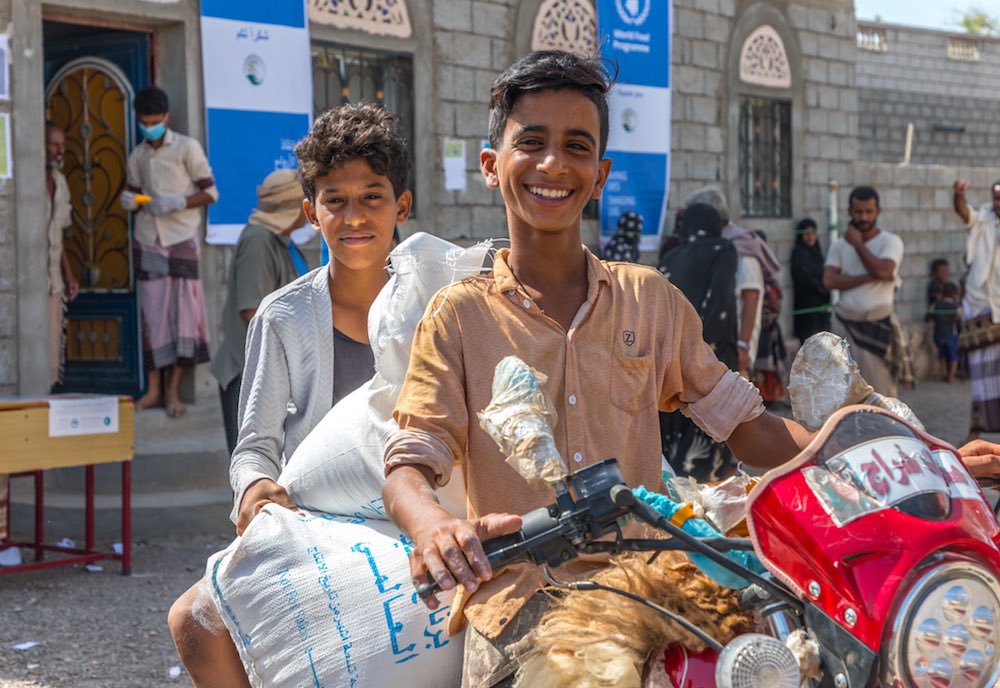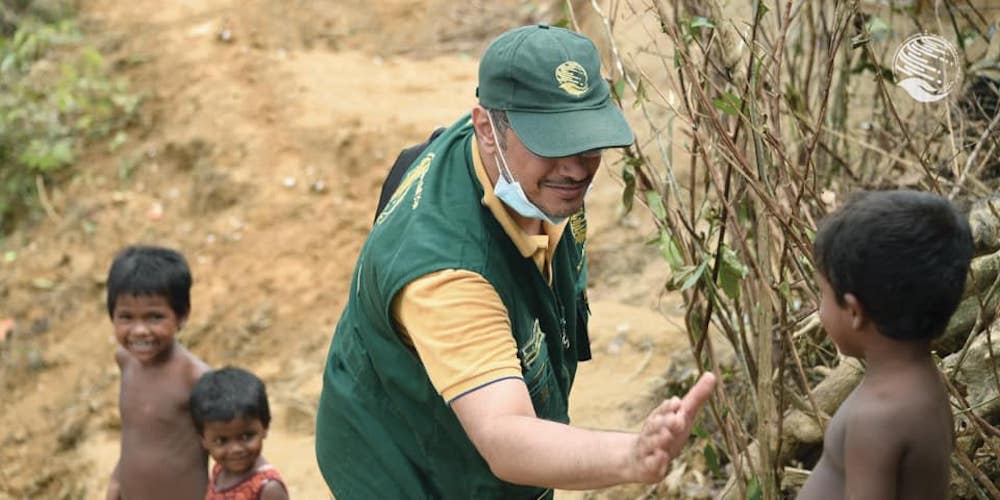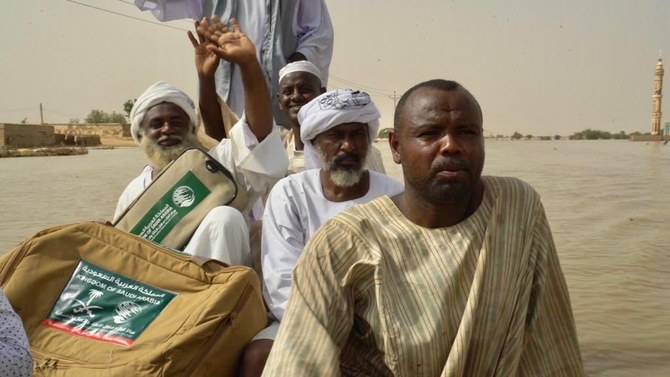JEDDAH: King Salman Humanitarian Aid and Relief Center (KSRelief) provides assistance to “needy people around the world regardless of religious, ethnic, and political background. The aid is free of any agenda, based instead on the mission for which it was founded.” These words of Dr. Abdullah Al-Rabeeah, the supervisor-general of KSRelief, sum up in a nutshell Saudi Arabia's commitment to peace, sanctity of human life and dignity. In an exclusive interview with Arab News, Al-Rabeeah discussed some of KSRelief’s 1,367 projects under way in 54 countries at a total cost of $4.673 billion (SR17.52 billion).
One area that KSRelief has focused on is the removal of landmines. Al-Rabeeah estimates Iran-backed militias in Yemen have laid as many as 1.1 million mines since the outbreak of the conflict. To date, more than 192,000 have been safely removed thanks to the KSRelief-affiliate, Project Masam.
Q: Is the work of KSRelief limited to just Arab and Islamic countries?
A: The humanitarian, relief and development activities of KSRelief extend to all needy countries of the world, including the Arab and Islamic countries. This is in line with KSRelief’s mission of providing aid to all needy and affected people around the world without the slightest discrimination (religious, ethnic, political or otherwise) and without linking aid to any agenda. KSReliefs 1,367 projects and programs cover 54 different countries around the world on all its continents.
INNUMBERS
KSRelief
* 1,367 KSRelief projects.
* 54 Beneficiary countries.
* $4.673bn Total project costs.
* $269m Project costs for 2020.
* 259 Projects undertaken in 2018.
Q: Development through education and training projects constitutes a large part of KSRelief’s work. What is the purpose of that?
A: To date, the center has implemented 74 educational projects, valued at $181.3 million in Yemen, Syria and Somalia and for the benefit of Rohingya refugees in Malaysia, Bangladesh and other countries of the world, based on Saudi Arabia’s belief in the importance of supporting education among stricken peoples, as well as enhancing educational opportunities for children outside school, which the Kingdom considers an important part of the humanitarian and relief work that it carries out.
In addition to that, KSRelief’s efforts included implementing vocational training programs in many countries to empower needy families by qualifying them with a profession or craft and enabling them with an income-generating project so that these families transform from being dependent on the community to being productive families that rely on themselves in securing the basic needs that help them to lead a decent life.

KSRelief Supervisor General Abdullah Al-Rabeeah attends the Saudi-UAE-OCHA Humanitarian High-level Meeting held at KSrelief headquarters in Riyadh, on May 22, 2019. (AFP/File Phot)
Q: Which are the main countries served by KSRelief, and how much aid has been provided to them?
A: KSRelief has a noticeable humanitarian presence in many of the affected countries and always seeks to extend a helping hand to these countries and peoples to alleviate their suffering and meet their basic needs according to an integrated system of education, health, food and shelter services. At the forefront of those countries is Yemen, which suffered a coup by the Houthi militia, which is supported by Iran.
KSRelief allocated most of its aid to the brothers in Yemen, and the projects implemented for Yemen amounted to 513 worth $3.253 billion. The Syrian people also received a large share of KSRelief’s support, as it implemented 225 projects in Syria with a total value of $296.9 million. It also carried out 88 projects in the occupied Palestinian territories with a value of $359.6 million. Other projects carried out by KSRelief include 54 projects in Somalia with a value of $197.8 million and 113 projects in Pakistan with a value of $120.4 million, among many others.
Q: How have KSRelief’s most recent projects helped displaced people in Yemen and communities affected by the Beirut port explosion and the Sudan floods?
A: Since its establishment, KSRelief has been working to provide various forms of humanitarian support to the Yemeni brothers, including shelter, food, health and education, covering all its governorates. KSRelief also initiated urgent relief for the brothers in Sudan, whose areas have recently been exposed to floods and natural disasters that have resulted in the loss of lives and property. An airlift was launched that included providing food, shelter, medical aid and assistance.
KSRelief also launched an airlift that included medical, housing and food aid for those affected by the Beirut port explosion, which had resulted in heavy losses of life, property and infrastructure. These urgent initiatives were the result of the generous directives of Saudi Arabia’s King Salman in extending a helping hand to needy and affected countries.

KSRelief allocated most of its aid to Yemen, and the projects implemented for Yemen amounted to 513 worth $3.253 billion. (Supplied)
Q: KSRelief is the only entity authorized to collect donations in the Kingdom. Has it been popular? Can non-residents donate?
A: KSRelief has an online donation platform for all its humanitarian and relief programs, through which donors, whether inside or outside the Kingdom, can create personal accounts that provide them with access to the programs they wish to support and donate to them using credit cards and electronic payment mechanisms. The platform also provides direct donations with the opportunity to link donations to the countries and programs of their choice.
This online platform is the only official platform that provides its users with the opportunity to donate to the programs of KSRelief, whose programs reach beneficiaries in many countries around the world, bearing in mind that the center does not deduct any administrative expenses from donations. As for its popularity, the platform is still new, and we hope for the best in the future.
Q: Health and the protection of women and children form part of KSRelief’s concern. Are there special funds allocated to these?
A: Each sector has a special budget and an amount allocated to it, regardless of the type of beneficiary. For example, the health sector has implemented 369 projects worth $797.8 million so far, while it has implemented 74 educational projects with a value of $181.3 million.
KSRelief has also carried out various projects for the benefit of women, amounting to more than 225 projects, and reached more than 62 million women worldwide in four years at a cost of $390 million. KSRelief also cares about children. Therefore, since its inception, it has managed to reach 114 million children through 234 projects. Therefore, the amount distributed to each project or each sector varies according to the size and type of the project.

KSrelief also initiated urgent relief for Sudan, which has recently been exposed to floods and natural disasters that have resulted in the loss of lives and property. (Supplied)
Q: Project Masam is one of KSRelief's most important initiatives implemented in Yemen. Is its remit limited to clearing landmines?
A: Project Masam is a Saudi humanitarian project specialized in clearing Yemeni lands of mines. Iranian-backed militias have laid more than 1.1 million mines across swathes of Yemen. Large quantities of them have been laid in areas inhabited by civilians.
Project Masam is removing these mines. It has so far cleared more than 192,000 from the land, schools and homes, many of them camouflage in a variety of shapes and colors and planted using different methods, killing and seriously injuring a large number of children, women and elderly people.
Q: How many Yemeni children have been helped through the child-soldier rehabilitation project?
A: KSRelief implements a qualitative program to rehabilitate children who have been recruited by the Houthi militia and thrown into the conflict as human shields. The center rehabilitates them, integrates them into society, returns them to their normal lives and provides social support so that they can live their lives as children.
This program, which received international acclaim, aims to educate parents about the dangers of child recruitment and works to create healthy family environments through awareness and educational sessions and by introducing laws that criminalize child recruitment.
Here I stress the importance of raising awareness of the danger of child recruitment, clarifying it to societies, and emphasizing the principles of human rights and international law that prohibit the exploitation of children in armed conflict.

With the support of KSRelief, a fifth batch of food baskets has been distributed in Madagascar to assist those affected by floods and hurricanes; the situation has worsened there recently due to the spread of COVID-19. (Supplied
Q: What facilities are provided for refugees inside Saudi Arabia, and how are they dealt with?
A: The Kingdom hosts hundreds of thousands of Yemeni, Syrian and Rohingya refugees who live on its territory as honored guests and visitors and not as refugees. They enjoy freedom of movement, enrollment in government schools, engagement in the labor market, and access to health services.
KSRelief has established a platform for refugees, displaced persons and visitors to highlight the type and volume of aid provided to them by Saudi Arabia both inside and outside the Kingdom. The aid provided to them has reached $13.7 billion so far.
Q: KSRelief works with several international organizations. How does it coordinate with them in Yemen and other beneficiary countries?
A: KSRelief is constantly and continuously coordinating with international humanitarian organizations to bring aid to the needy. In Yemen, KSRelief is one of the biggest supporters in the field of humanitarian work in all Yemeni governorates and regions. Therefore, all humanitarian organizations operating inside Yemen seek to coordinate with the center to facilitate the delivery of aid to the afflicted. KSRelief has branches inside Yemen that meet periodically with humanitarian organizations to provide exemplary work in the relief and humanitarian fields.

KSRelief provides assistance to “needy people around the world regardless of religious, ethnic, and political background.” (Supplied)
Q: How many volunteers support KSrelief? How are they integrated into its work?
A: KSRelief has established a platform for volunteering. The number of registered volunteers has reached 15,562, who have been classified according to their specialties and the center’s need for their services.
KSRelief’s volunteer programs fall under the Kingdom’s Vision 2030 and are based on the principle of voluntary work as one of the seven principles of humanitarianism recognized by international law.




































